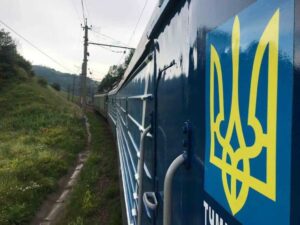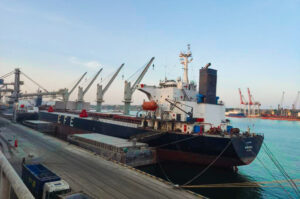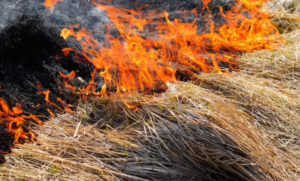
Since August 2023, the sea corridor created by the Ukrainian Navy has exported almost 36 million tons of cargo, said Oleksandr Kubrakov, Vice Prime Minister for Reconstruction of Ukraine, Minister of Community Development, Territories and Infrastructure (Ministry of Reconstruction).
“More than 36 million tons of cargo have been exported via the Ukrainian sea corridor since August 2023. This is higher than the figures of the Grain Initiative for the year of its existence,” Kubrakov wrote on Facebook on Saturday.
According to him, 195.7 thousand tons were loaded on the largest of those that called after the full-scale invasion of Ukrainian ports, the Panamanian-flagged CAPTAIN LEONIDAS at Pivdennyi port. The vessel is 300 meters long, 50 meters wide, and has a deadweight of over 203 thousand tons.
Since August 2023, 1,286,000 vessels have sailed through the Ukrainian sea corridor, exporting 25 million tons of agricultural products to Asia, Africa, and Europe. There are 135 vessels waiting to enter the Black Sea ports, which are expected to export another 4 million tons of cargo.
“The Ministry’s team is working hard to ensure the stable movement of exports by sea and reach the targets by 2022,” Kubrakov wrote, emphasizing that the Ukrainian corridor is an effective logistics route, the rhythmic operation of which is the result of joint efforts of the state, the Joint Defense Forces and the entire maritime infrastructure team.
Earlier it was reported that exports via the Ukrainian sea corridor reached 33.8 million tons in 7 months.

Ukrzaliznytsia JSC (UZ) plans to increase passenger traffic by 10% to 27.5 million passengers in 2024, according to a presentation made by the company’s CEO Yevhen Lyaschenko during a chat with journalists on Thursday.
At the same time, revenue from passenger transportation is expected to grow to UAH 10.6 billion in 2024, up from UAH 9.3 billion last year and UAH 5.3 billion a year earlier.
The growth in passenger traffic is driven by the launch of trains on international routes, according to a presentation by Ukrzaliznytsia. In particular, revenues from international passenger transportation amounted to UAH 2.6 billion in 2023, compared to UAH 1 billion in 2022. In fact, 2.1 million passengers were transported, compared to 1.1 million in 2022 and 0.04 million in 2021. In 2024, UZ expects to carry 2.3 million passengers, generating UAH 3.5 billion in revenue.
“International transportation, unlike domestic transportation, is profitable. We break even only on the Lviv-Rava-Ruska-Warsaw route (operated by the Polish company SKPL, which receives payment from UZ for services – IF-U),” Lyashchenko said.
In 2024, UZ also expects to increase domestic transportation to 25.2 million passengers, up from 22.8 million last year. Revenue from their transportation is expected to increase from UAH 6.7 billion in 2023 to UAH 7.2 billion.
The company reminded that in 2023, 15 new passenger trains were appointed, increasing the number of domestic routes to 66. In addition, three new international routes were launched: Vienna-Budapest-Chop, Lviv-Rava-Ruska-Warsaw, and Chop-Prague (operated by the Czech railway operator RegioJet – IF-U). The number of international routes in 2023 reached 25.
UZ plans to overhaul 63 passenger cars in 2024, which will increase the capacity of the passenger service. Also, the overhaul of the laundry in Kyiv, which will improve the quality of washing and the volume of laundry processing.
The seat availability monitoring feature, which is currently being tested in the UZ app, will be launched in full. The company also plans to integrate online scoreboards with a GPS system, refine loyalty programs, and update the classification of cars depending on their brand, which will make it easier for passengers to find the right category for them depending on the range of services.

“Kernel, one of Ukraine’s largest agricultural groups, has purchased a third vessel for grain exports with a carrying capacity of more than 50,000 tons, the agricultural holding’s press service reports on Facebook.
“We have purchased a new vessel Rotterdam Pearl V, capable of exporting more than 50 thousand tons of grain. Now our fleet already includes three vessels that can export about 100 thousand tons of grain and 20 thousand tons of sunflower oil per month,” the statement said.
The company added that it continues to invest in expanding maritime logistics capabilities for the Ukrainian agricultural industry.
“Our own fleet has been providing Ukrainian exports to the Mediterranean and North-East Atlantic countries for more than a year and allows us to manage costs along the entire logistics chain. The development of our own shipping, in particular, does not force us to fix tonnage from the market, which is unprofitable during the period of inflated freight rates during martial law,” the statement said.
Before the war, Kernel Agro Holding was the world’s leading producer of sunflower oil (about 7% of global production) and its exports (about 12%). It is one of the largest producers and sellers of bottled oil in Ukraine. In addition, it is engaged in the cultivation and sale of agricultural products.
Kernel’s net profit for FY2023 amounted to $299 million, while the company ended the previous year with a net loss of $41 million. The agricultural holding’s revenue for FY2023 decreased by 35% to $3.455 billion, but EBITDA increased 2.5 times to $544 million.

The volume of shares outstanding globally is shrinking at the fastest pace in 25 years as the number of offerings falls due to economic and geopolitical uncertainty while companies continue to buy back significant amounts of their securities, writes the Financial Times.
Net volume of publicly traded shares has already fallen by $120 billion this year, compared with $40 billion for the full year 2023, according to JPMorgan. The decline marks the third consecutive year of decline, which hasn’t happened since the settlement began in 1999.
According to the bank, the scale of buyback programs this year is comparable to their volumes in the previous three years. By December, according to forecasts, the total amount of buybacks could reach $1.2 trillion.
At the same time, expectations for IPOs and other equity offerings have not yet been met, the article notes.
The two trends reflect “ongoing uncertainty” among companies around the world, said Nikolaos Panigirtzoglou of JPMorgan.
Stock offerings were previously expected to increase this year as investors became more confident that the U.S. (the world’s largest stock market) could avoid an economic recession. But lingering fears that inflation could accelerate again due to strong economic growth mean that “it hasn’t really happened,” Panigirtzoglu said. “It shows that some people don’t think the worst is behind them,” he added.
Last November, analysts at JPMorgan predicted the stock market would grow by $360 billion in 2024 thanks to IPOs of new companies and buyback reductions.
Since 2000, the number of listed companies in the US has fallen from more than 7,000 to less than 4,000, according to index provider Wilshire. A similar trend has been seen in Europe and the UK.

Kyivstar, the largest electronic communications operator, and SHERIFF, a holding of security companies, including SHERIFF Demining, which is a certified mine action operator, have signed a memorandum of cooperation.
Ukraine is currently the most mined country in the world. According to the State Emergency Service, about 175 thousand square kilometers of territory are contaminated with mines and unexploded ordnance. That is why Kyivstar and SHERIFF Demining are starting to work on a technology for humanitarian demining operators.
The companies will jointly test RTK signal correction services, which will ensure high accuracy of mapping contaminated areas and marking explosive objects.
“Helping to rebuild the country is an important mission not only for Kyivstar, but also for the entire Ukrainian business. To speed up the process of demining and rebuilding the country, we are ready to share our experience in implementing the latest technologies that will save lives of Ukrainians,” comments Ilya Poltakov, Kyivstar’s Director of New Business Development. “In particular, for safe demining it is important to ensure the identification of the exact coordinates of mines and the boundaries of contaminated areas. This requires high-quality GNSS equipment with RTK technology support.”
Kyivstar will provide its partners with access to RTK technology and provide recommendations on the selection and use of GNSS receivers. The company’s specialists will also conduct analytical research to test positioning and location technologies.
“We expect that cooperation with Kyivstar will help us to significantly improve the accuracy of explosive ordnance detection and subsequent demining. This will allow us to clean up contaminated areas faster and safer and return them to peaceful life,” commented Yevhen Antypenko, SHERIFF Director.
About Kyivstar
Kyivstar is the largest Ukrainian electronic communications operator, which as of December 2023 served about 24 million mobile subscribers and more than 1.1 million Home Internet subscribers. The company provides services using a wide range of mobile and fixed technologies, including 4G, Big Data, Cloud solutions, RTK cybersecurity services, digital TV, etc. Kyivstar is developing new telecom technologies in Ukraine and plans to invest USD 600 million in this area over the next three years. The company is helping the country overcome the challenges of wartime and has allocated over UAH 1.8 billion over the past two years to support the Armed Forces, subscribers, local communities, and charitable initiatives. The sole shareholder of Kyivstar is the international VEON Group headquartered in the Netherlands. The Group’s shares are listed on the NASDAQ (New York) and Euronext (Amsterdam) stock exchanges. Kyivstar has been operating in Ukraine for more than 25 years and is recognized as the largest taxpayer in the telecom market, the best employer and a socially responsible company.
For more information: pr@kyivstar.net, www.kyivstar.ua
About SHERIFF
SHERIFF Security Holding is a national security operator that has been operating in Ukraine since 2003 and is a leader in the security services market. The company offers the maximum portfolio of services in its field: demining (certified mine action operator), a license to provide collection services and a NBU permit for a cash processing and transfer center, physical security, fire alarm maintenance and monitoring, fire extinguisher recharging, installation of video surveillance systems (including analytical systems) and access control, monitoring and response to burglar alarms, as well as Transfer customer support services, cargo escort, armored taxi, and other services. More than 40,000 clients have entrusted their security to SHERIFF.
For more information: pr@sheriff.com.ua, www.sheriff.com.ua

In the summer, Ukraine is expected to experience uneven precipitation across the country, which is why there is a high probability of extreme fire danger – such periods may occur in June and August throughout the country, said Natalia Ptukha, a spokeswoman for the Ukrainian Hydrometeorological Center.
“According to tentative forecasts, for this season, for 2024, from April to September, the average monthly temperature is expected to be 1-2 degrees higher than normal,” she said during a briefing at the Media Center Ukraine on Friday.
According to her, in the summer there is a high probability of uneven precipitation both across the territory of Ukraine and in principle in time. “As a result, there is a high probability of long periods of extreme fire danger, including 7-10 days without precipitation. These are mainly June and August throughout Ukraine. In the southern regions, this can also be observed in May and September,” explained Ptukha.